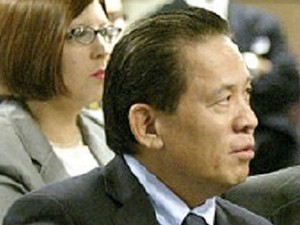What Went Before: Kazuo Okada case

MANILA, Philippines— In November 2012, an exclusive Reuters report alleged that Kazuo Okada’s Universal Entertainment Corp. handed around $40 million to Rodolfo Soriano, a former consultant of Philippine Gaming Corp. (Pagcor), around the time the firm was lobbying to win concessions for a $2-billion casino on Manila Bay in 2010.
Soriano allegedly served as the bagman of former Pagcor chair and chief executive officer Efraim Genuino. Genuino resigned as Pagcor chair in June 2010 while Soriano quit as Pagcor consultant a day later.
Records reviewed by Reuters showed that the $5 million transferred from Nevada-incorporated Aruze USA was sent first to Future Fortune, which was set up in Hong Kong in 2008 and run by Universal employees.
From that Future Fortune’s HSBC bank account, the money was sent to People’s Technology Holding Ltd., a firm established in 2009 and wholly owned by Soriano.
The remaining $35 million was paid in January-May 2010 to a firm called Subic Leisure and Management, according to records.
Subic Leisure was registered in the British Virgin Islands in September 2008, weeks after Universal acquired reclaimed land on Manila Bay and announced plans to build Asia’s largest aquarium, a Ferris wheel and a 2,050-room hotel and casino.
In response to the report, Pagcor chair Cristino Naguiat made a written request to the Department of Justice to look into the allegations “in the interest of the service and pursuant to the provisions of existing laws.”
On Nov. 22 last year, Justice Secretary Leila de Lima, through Department Order No. 995, formed a three-member panel composed of Marlon Tauli of the National Bureau of Investigation Anti-Graft Division; Catherine Camposano, executive officer of the internal audit unit of the NBI director’s office; and Senior Assistant State Prosecutor Rosalina Aquino.
In March, Okada and his company, in a filing with the Nevada Gaming Control Board, denied the allegations of bribery and questioned the legitimacy of the report, saying it was used as a tool for Okada’s rival, casino magnate Steve Wynn, to redeem and cancel the Japanese businessman’s 24.5 million shares in the Las Vegas-based Wynn Resorts.
Former partners and close allies, Okada and Wynn had a public falling out allegedly because Okada—Wynn Resorts’ largest single shareholder—wanted to invest in Pagcor’s Entertainment City, which is being touted as a gaming center to rival Macau where Wynn has a large operation.—Inquirer Research
Source: Inquirer Archives
